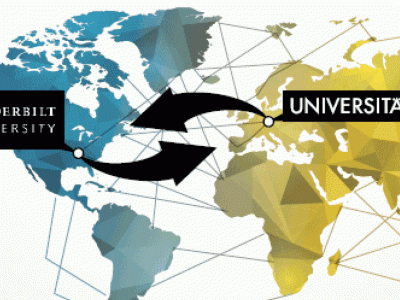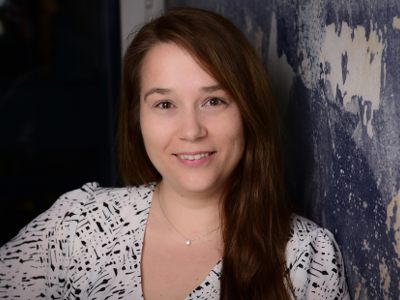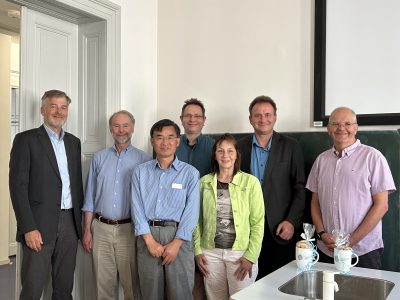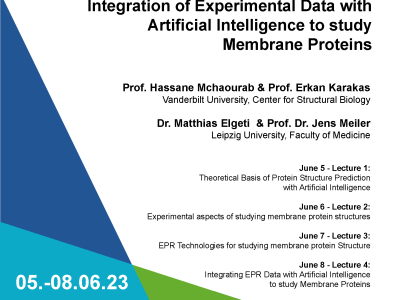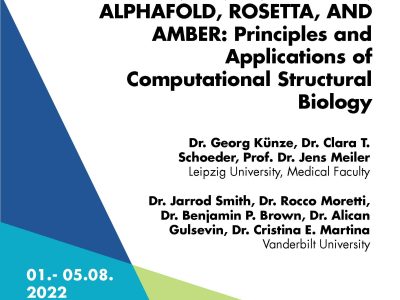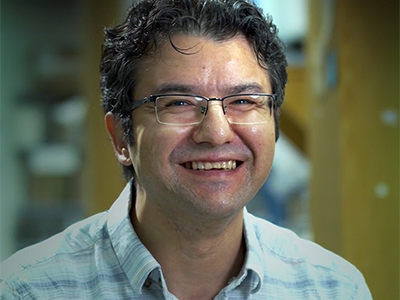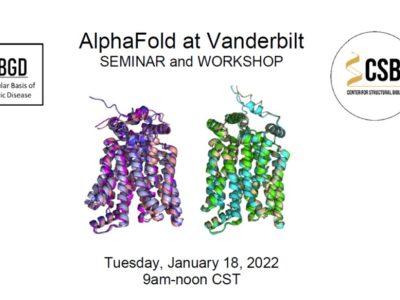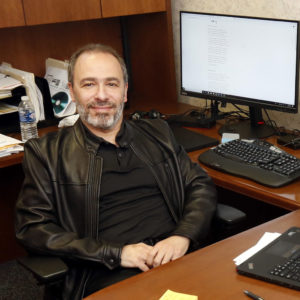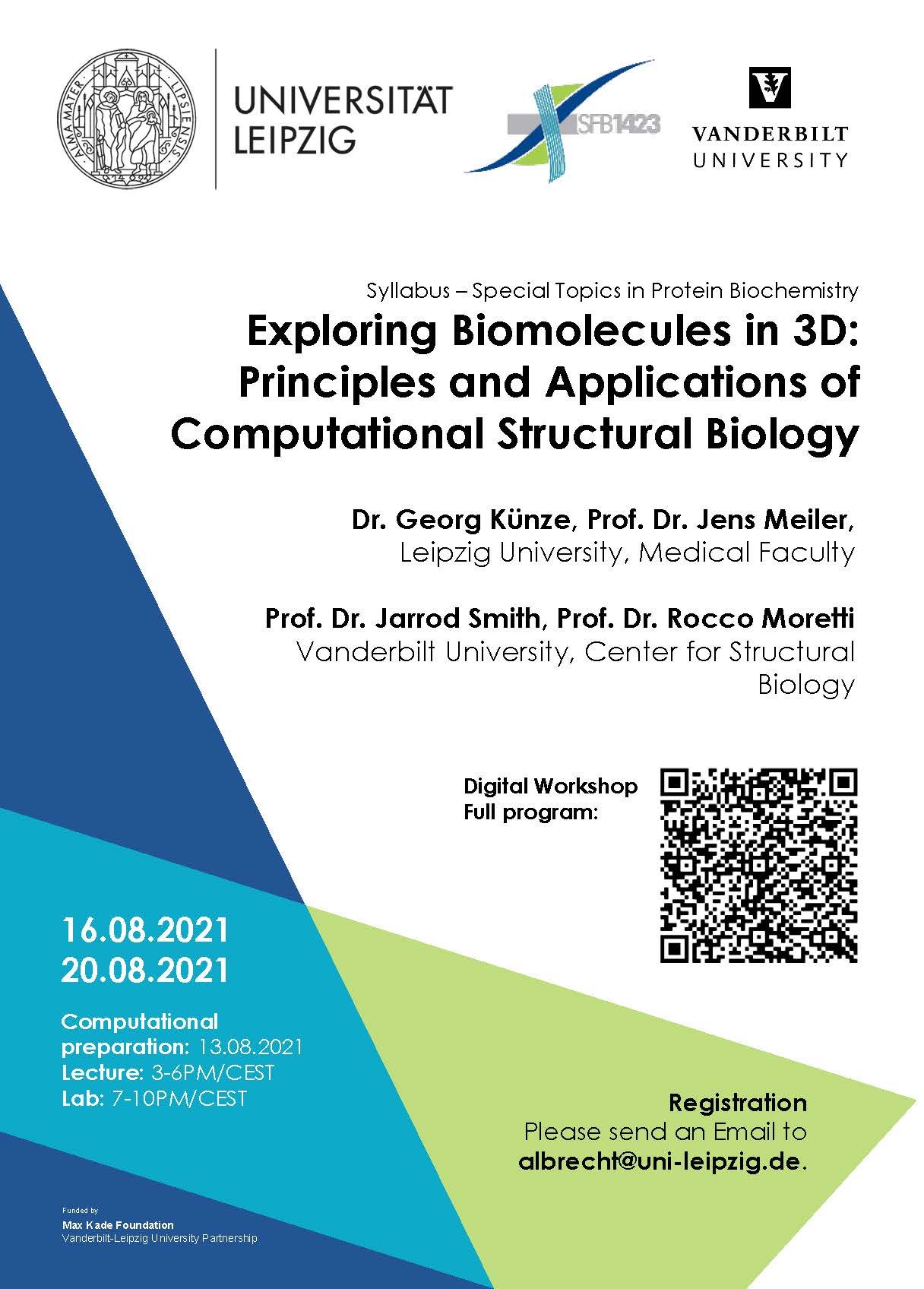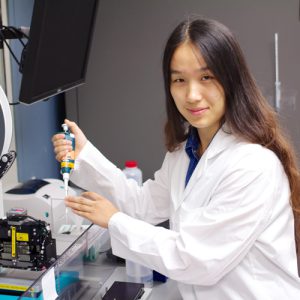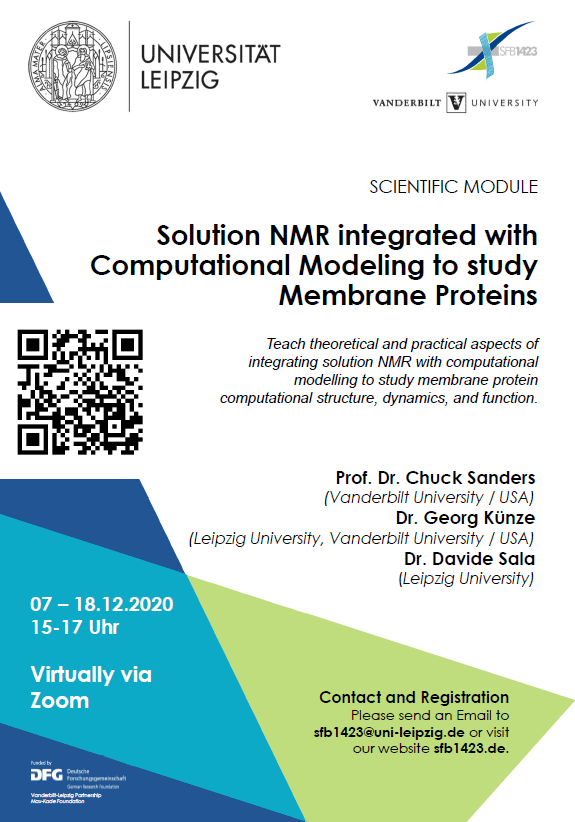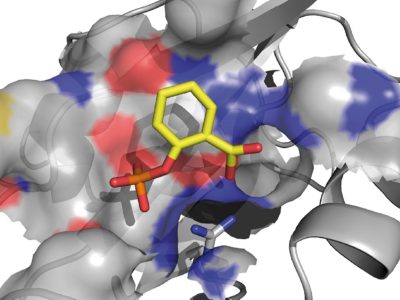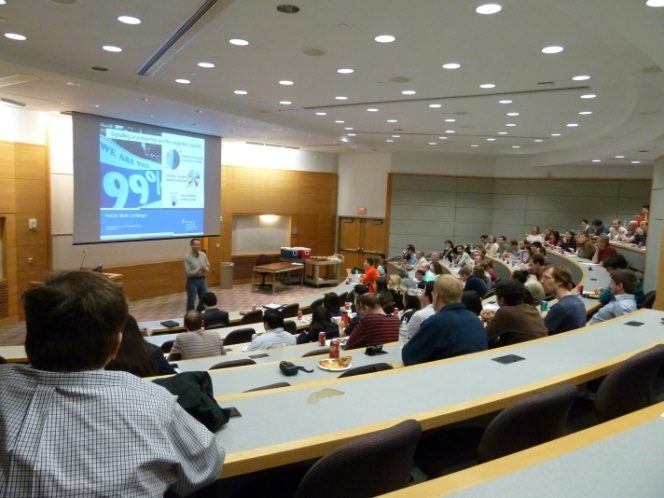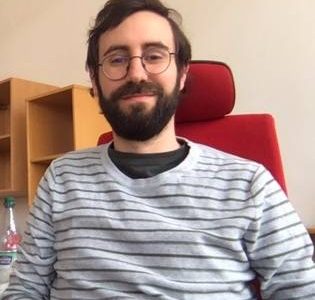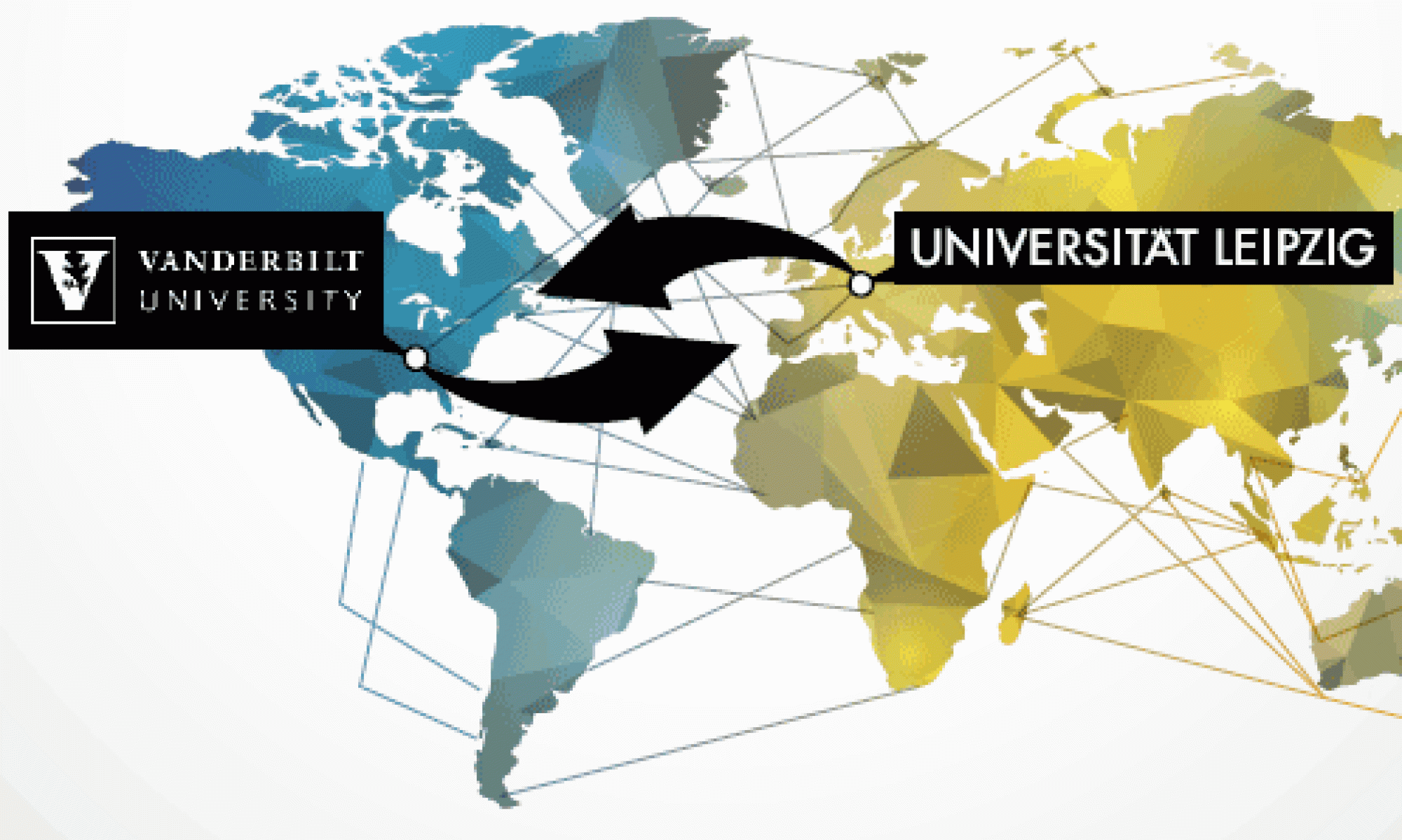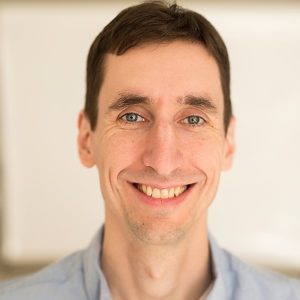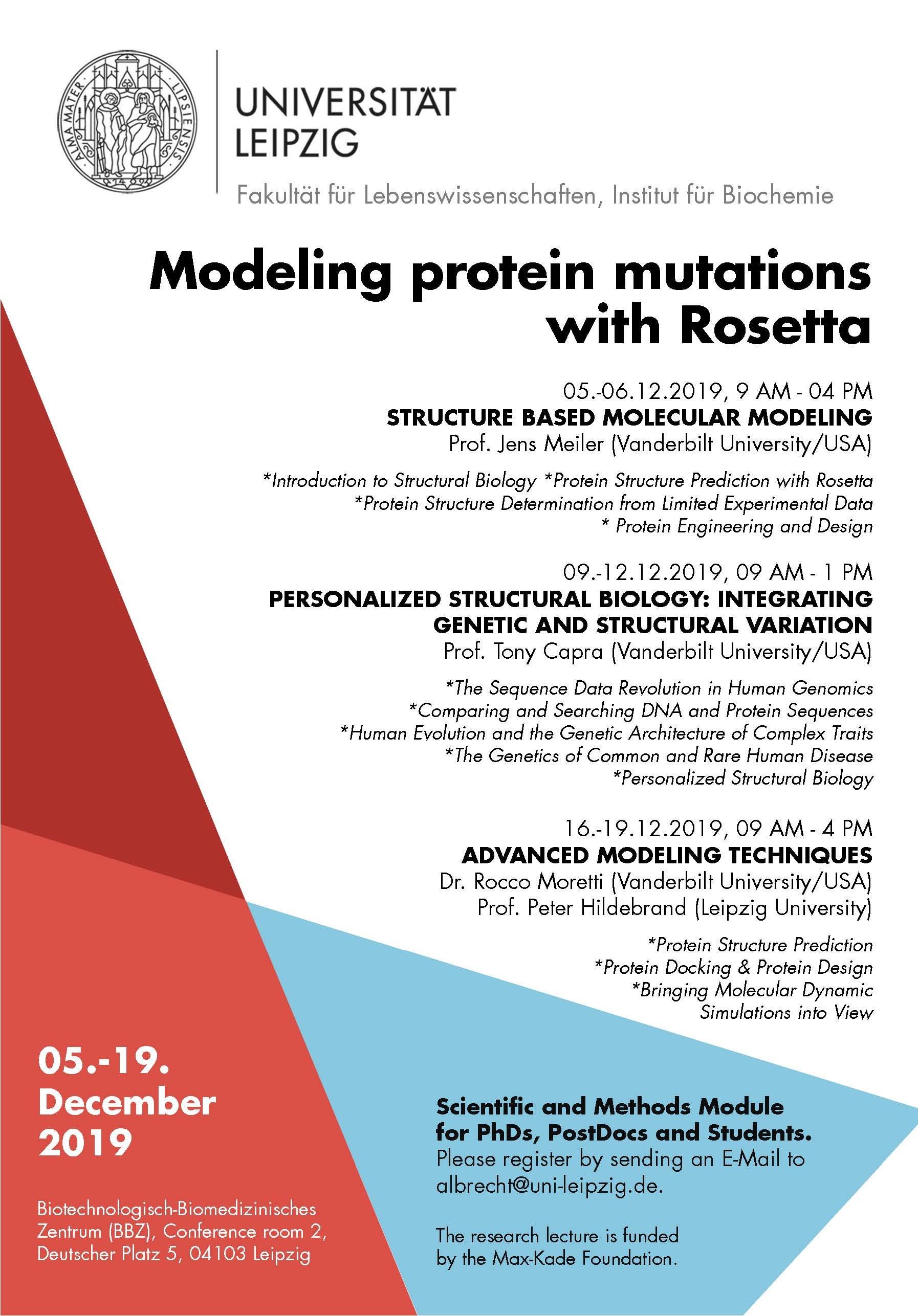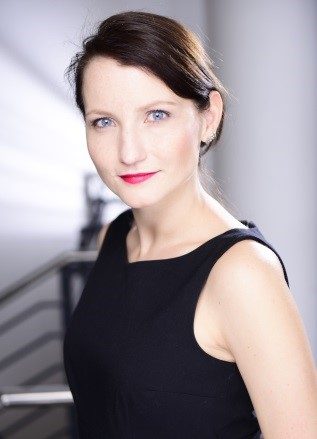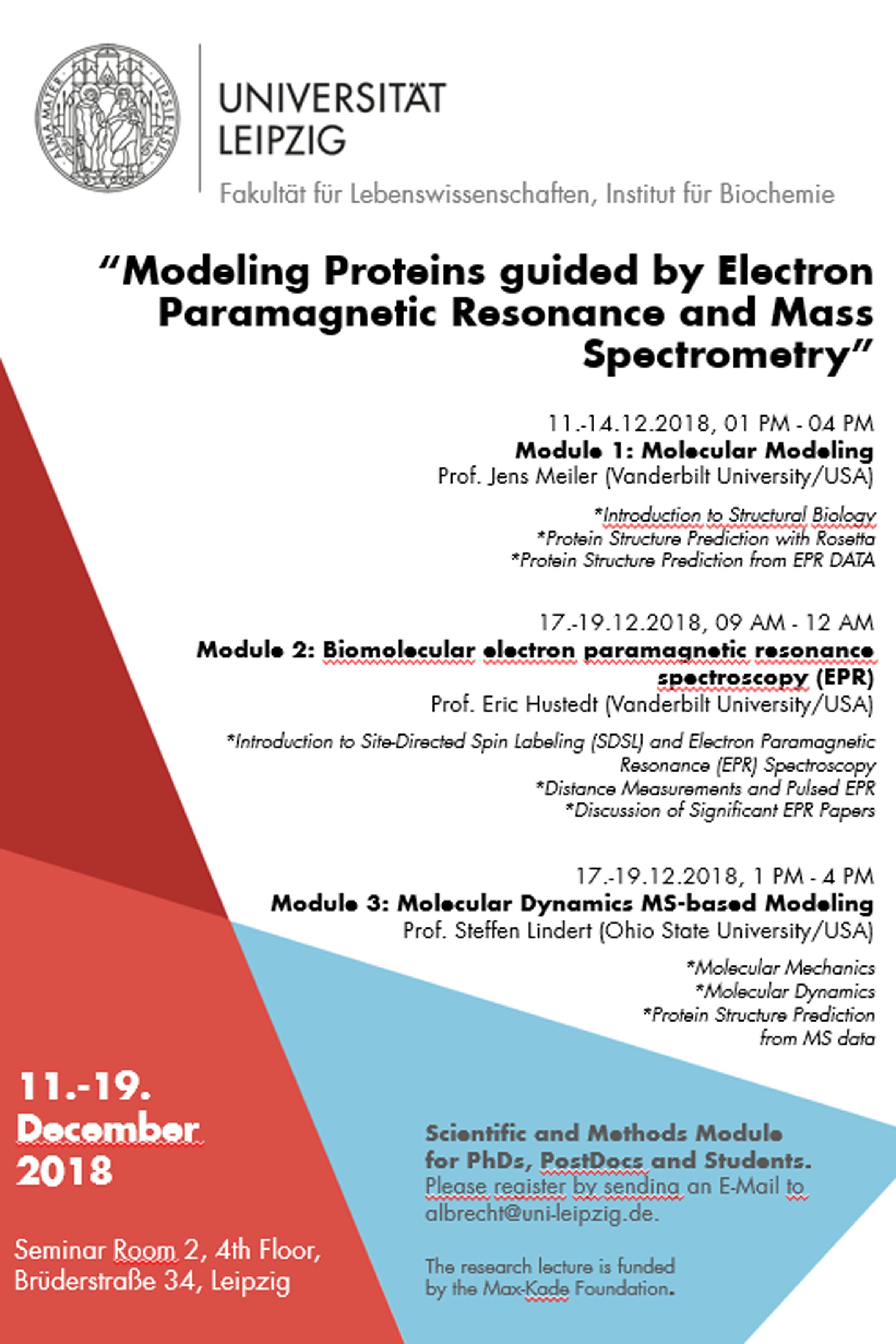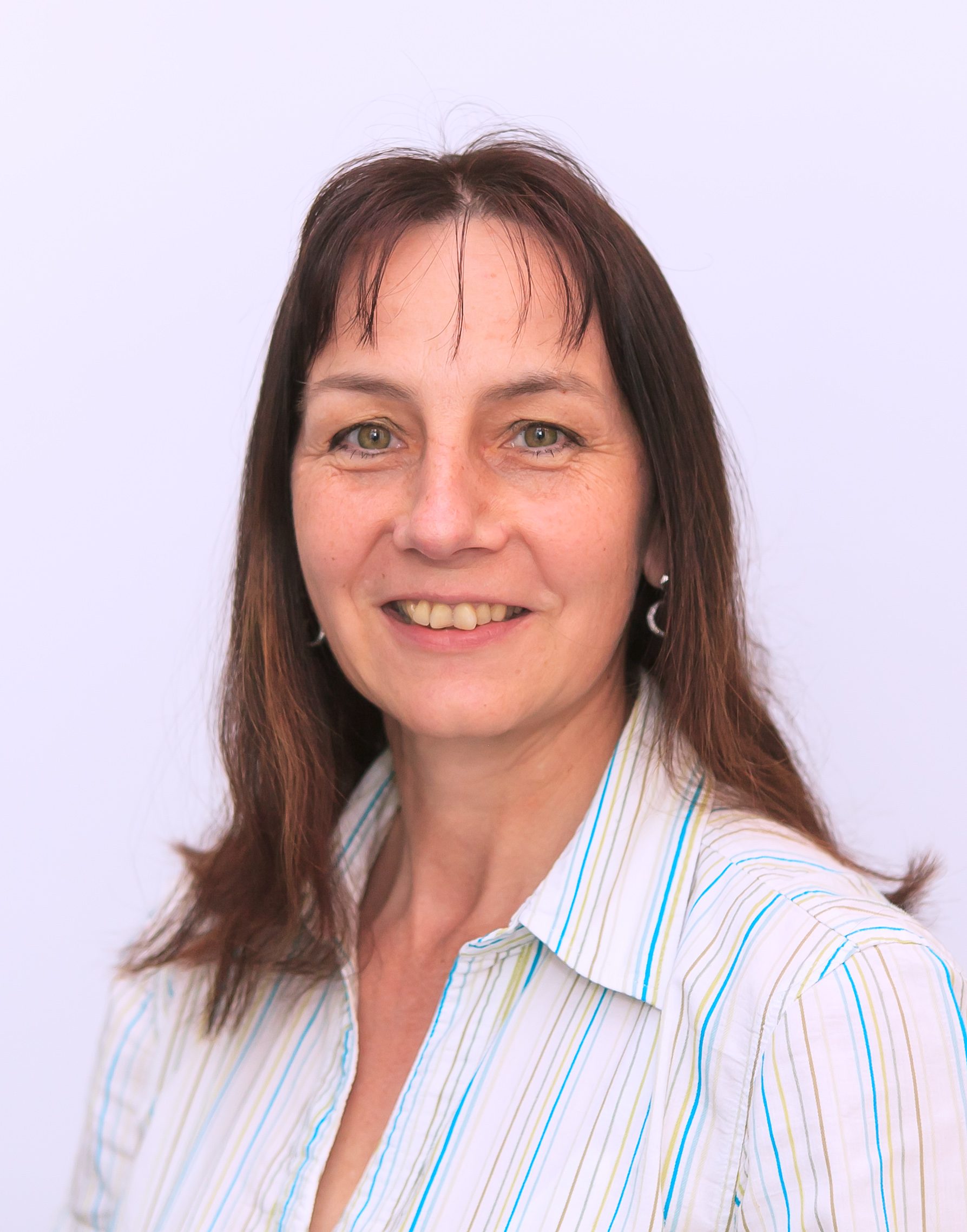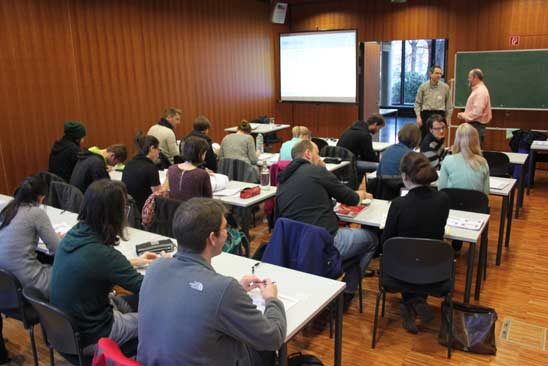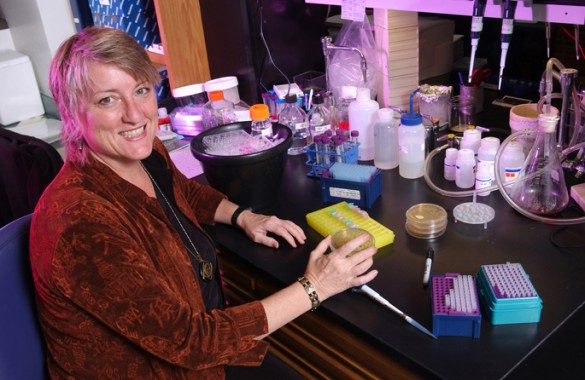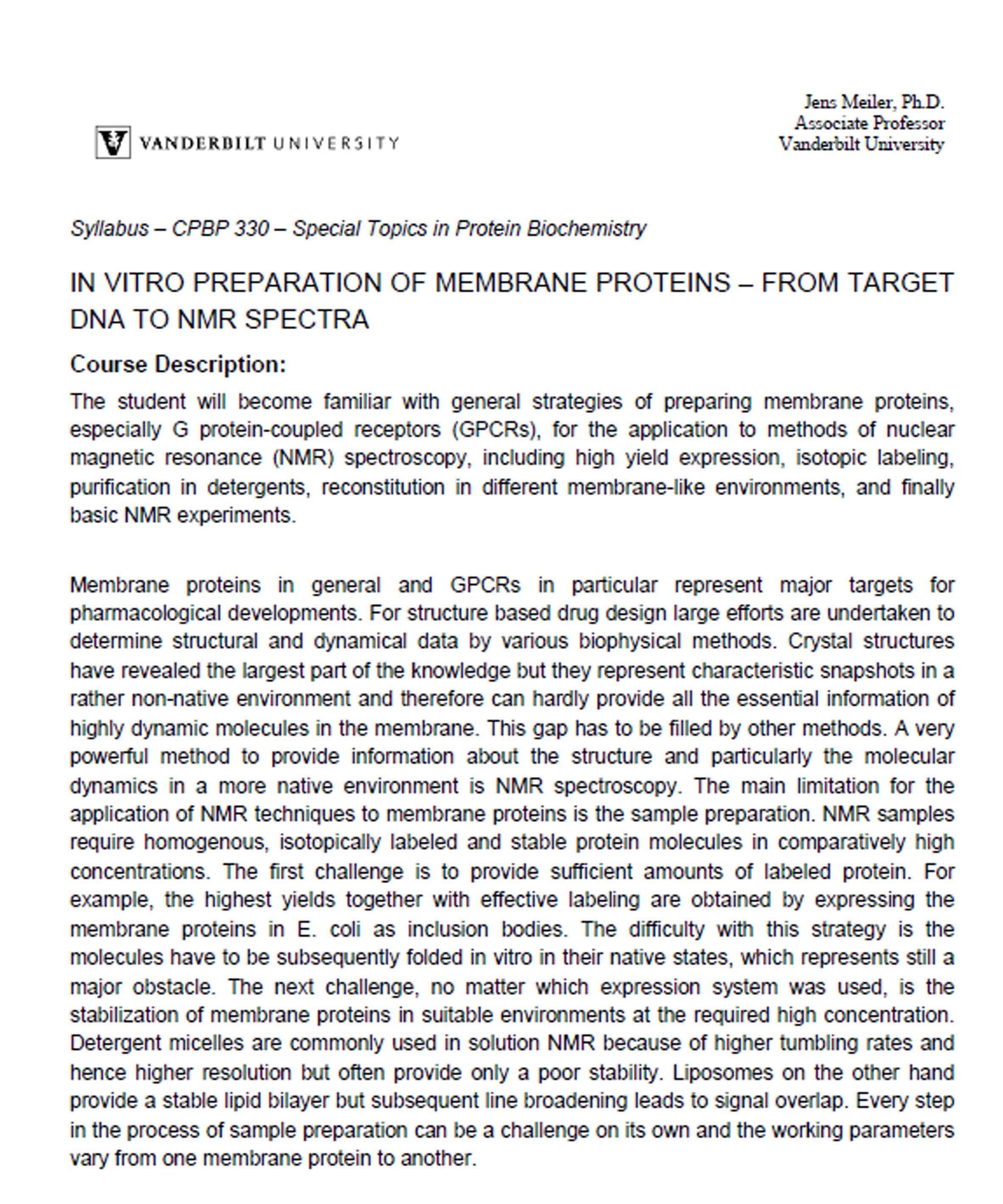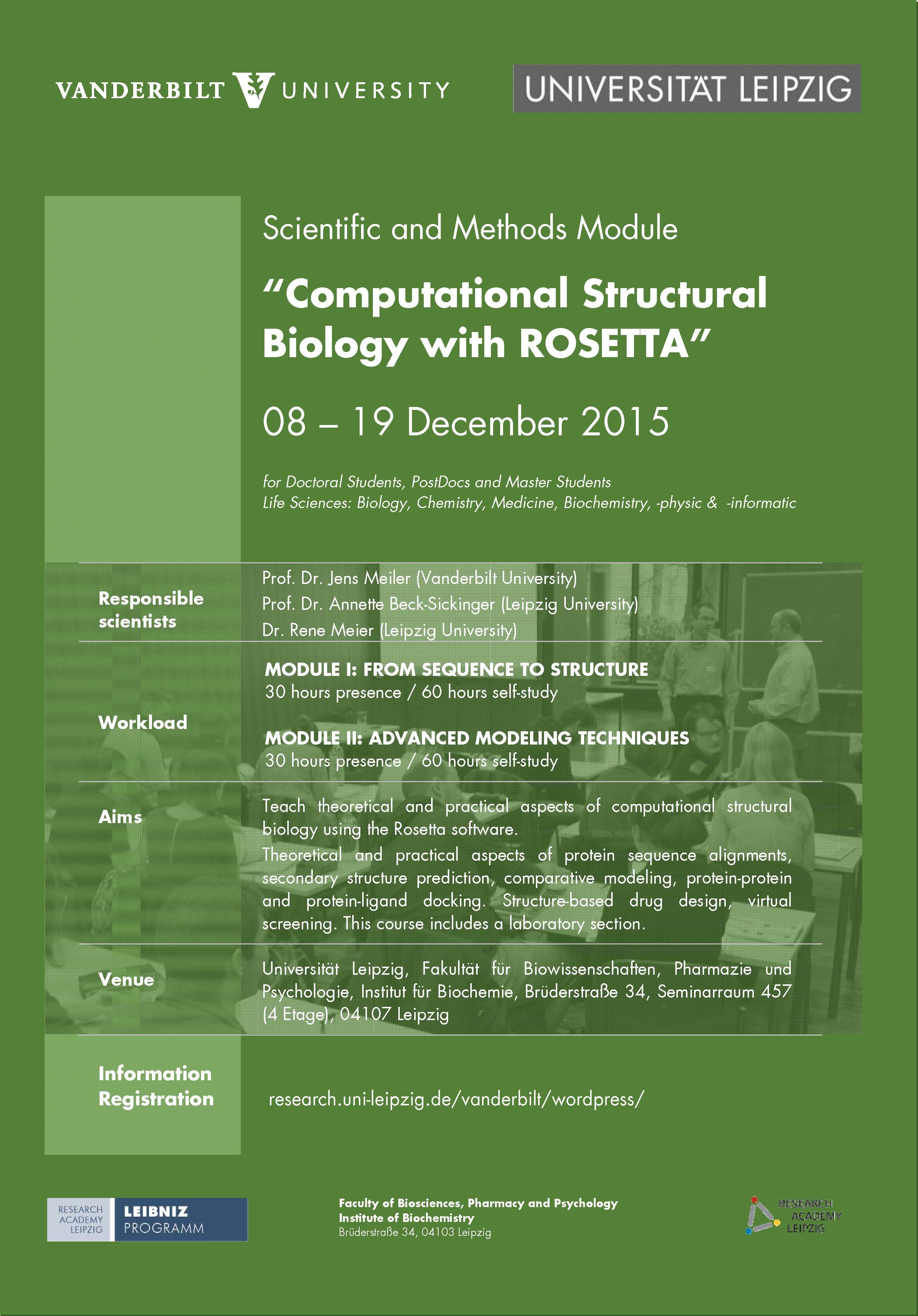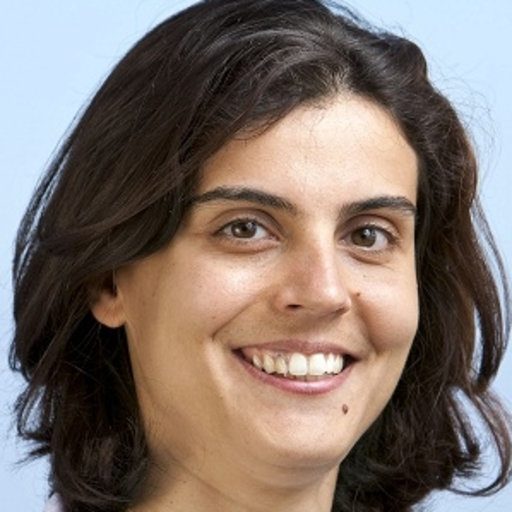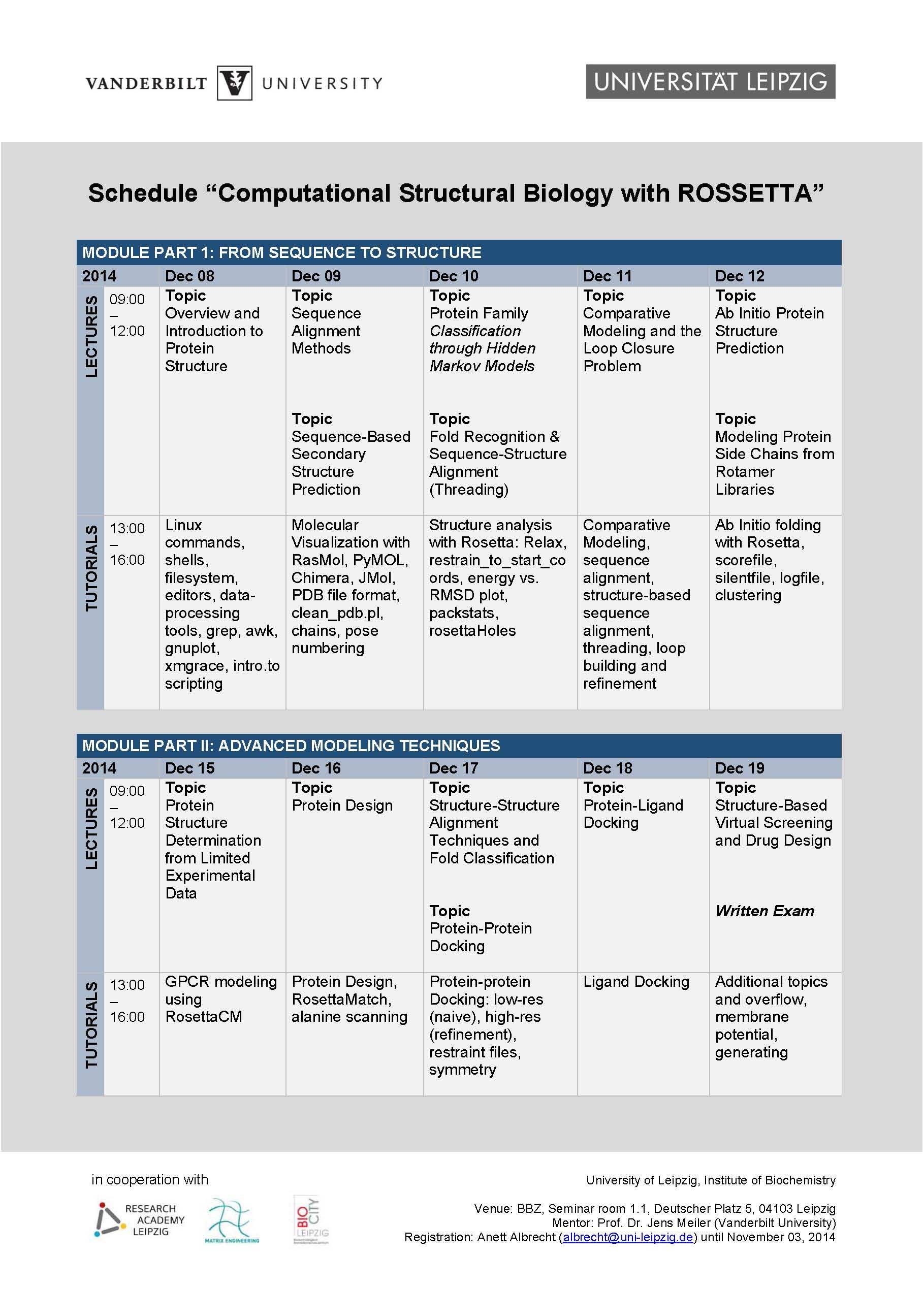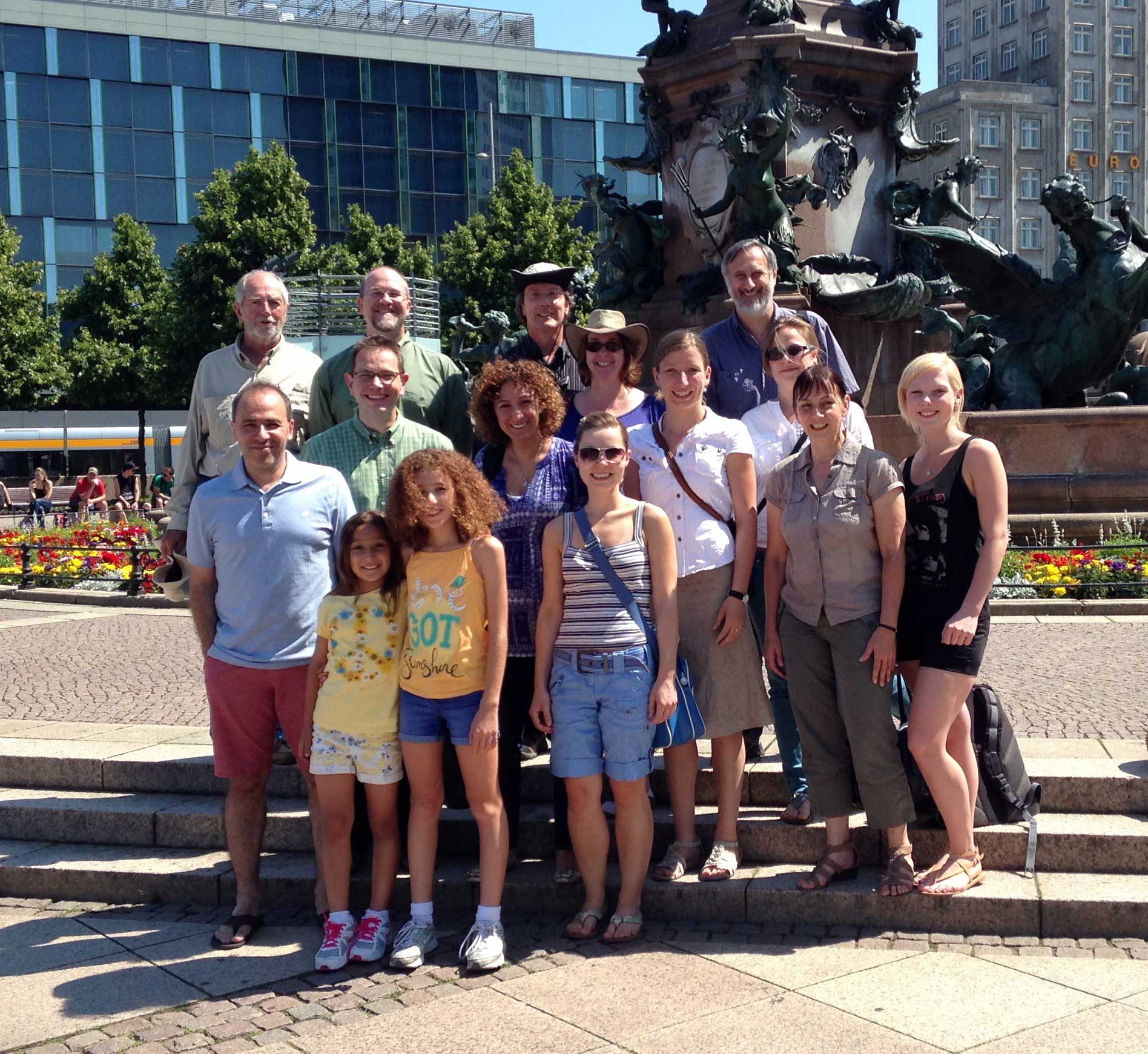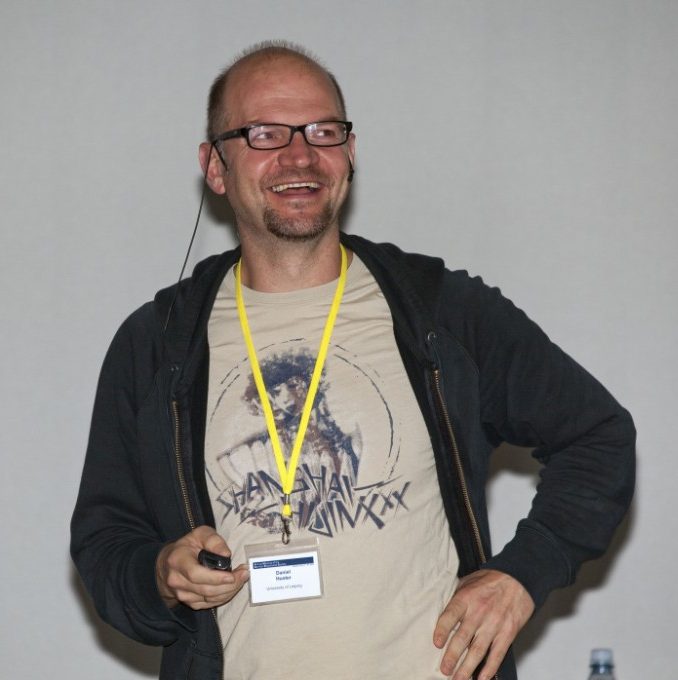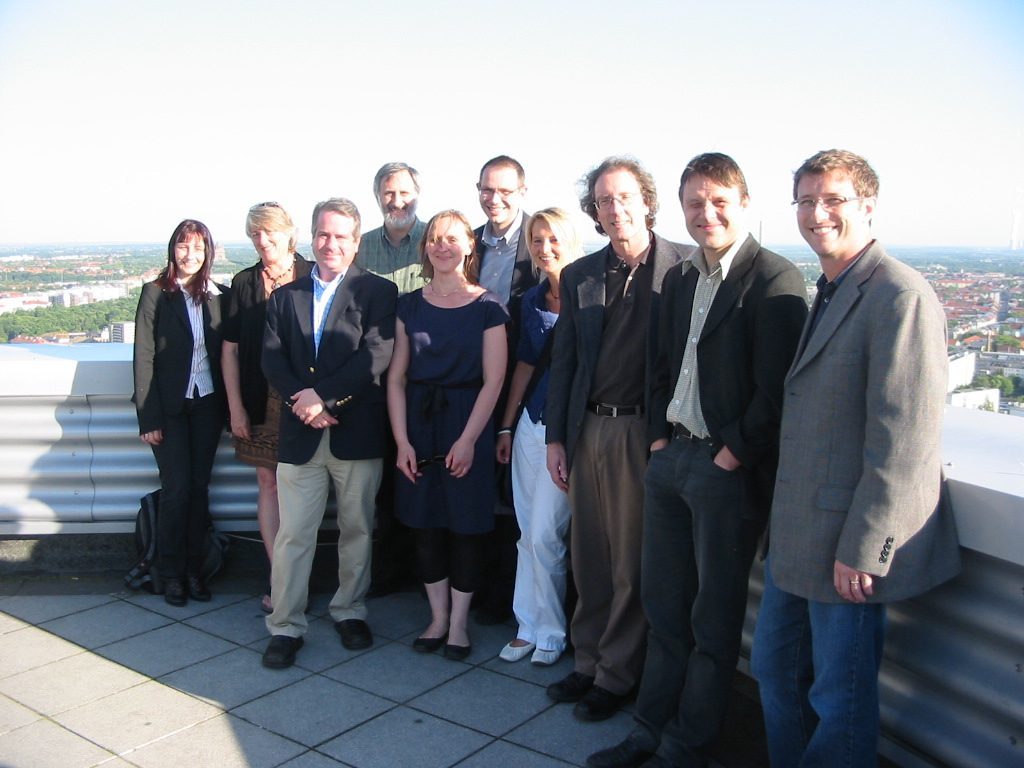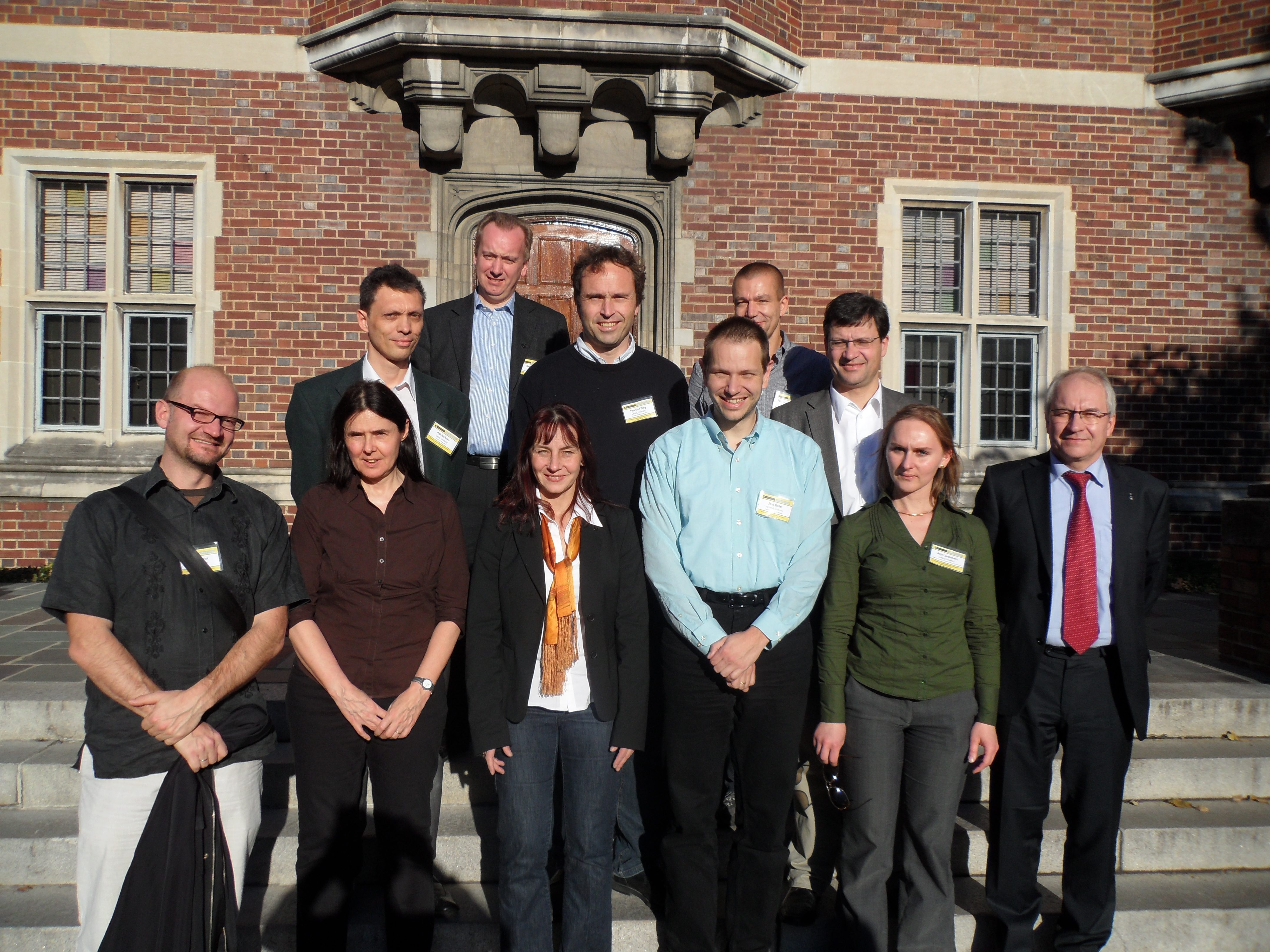We cordially invite you to a one week block online seminar “Computational Design and Directed Evolution of Therapeutic Peptides” by: Prof. Allison Walker, PhD., Prof. Dr. Jens Meiler (Vanderbilt University) Prof. Dr. Annette Beck-Sickinger, Jun.-Prof. Dr. Christina Lamers, Jun.-Prof. Dr. Clara T. Schoeder, Prof. Dr. Leonard Kaysser, Dr. Georg Künze(Leipzig University) DATE16 – 20. December 2024 / 2-6PM COURSE DESCRIPTION Peptides as therapeutics are an emerging class of therapeutics modalities, due to their high binding affinities and specificities. Here we will discuss their characteristics as therapeutic class and give an overview on recent and future developments. Furthermore, we highlight strategies for identification and optimization of peptide therapeutics. We will also cover emerging technologies for structure-based
We offer the possibility to join the lecturer portion of the Vanderbilt University CPBP Course „Modern Methods in structural bioinformatics“ from Aug 12 – 16, 2024 online via Zoom. The course is coordinated by Jens Meiler and Eric Bell, MRBIII at Vanderbilt University and Leipzig University faculty member Georg Künze, PhD, who specializes in GPCR research, will discuss “Molecular Dynamics theory”. DATE AND VENUEAugust 12-16, 2024Lecture portion: 9am-12pm (Nashville time) / 3pm – 6pm (Leipzig time). Lab portion: 1pm – 4pm (Nashville time).MRBIII Room 5131 (morning lecture) and Stevenson Center Room 5119 (afternoon laboratory PROGRAMAug 12, 2024 Fundamentals of protein structure • concepts in deep learning • data representation and databases
The existing Leipzig-Vanderbilt Exchange Program, a 10-year program sponsored by the Max Kade Foundation and Vanderbilt and Leipzig Universities, provides selected students, postdocs and project leaders an opportunity for an 3 month academic experience in the United States or Germany, celebrated its 15th anniversary during the week of August 19 in Nashville. Together with more than 20 project leaders and the academic representatives this international symposium will specifically aim to provide a platform for networking and scientific exchange: by Lab-visits, individual groupmeetings, talks and discussions we will deepen the longstanding scientific collaborations and this will strenghend the bilateral partnership with joint research projects. This partnerschip existence since 2009 and based on
The Meiler lab is hosting a Max Kade Foundation sponsored short course on Friday, March 15, from 11:30am-1:30pm in the CSB conference room (5131 MRB3). Leipzig University faculty member Sandra Berndt, PhD, who specializes in GPCR research, will discuss “Protein Expression and Purification for Structural Studies.” The course will discuss the expression of proteins focusing on the E. coli expression system. Different vectors, promotors, E. coli strains and growing conditions will be discussed. Some topics for trouble shooting will be addressed, like codon usage, posttranslational modifications, and the formation of inclusion bodies. Furthermore, protein purification techniques will be presented. At the end, protein parameters will be summarized, which are important for
On June 9, we invited representatives from Vanderbilt University to Leipzig for a scientific exchange at the first symposium after the corona pandemic. The international scientists of the Vanderbilt Diabetes Research and Training Center talk about kidney-focused and diabetes-related research: Prof. Dr. Roy Zent: “The actin cytoskeleton in epithelial cell repair”Prof. Dr. Ming-Zhi Zhang: “The role of ErbBreceptor family in progressive kidney disease and metabolic syndrome”Prof. Dr. Matthias Blüher: ”Healthy obesity –myth or fact?” Prof. Dr. Raymond Harris: “The role of myeloid cyclooxygenase-2 in kidney injury and adiposity”Prof. Dr. Ambra Pozzi: “Cell penetrating peptide therapy in organ fibrosis”Prof. Dr. Berend Isermann:„Coagulation protease signaling in kidney disease –on the path to new therapies?”
We cordially invite you to a four day block seminar “Integration of Experimental Data with Artificial Intelligence for the Investigation of Membrane Proteins” by: Dr. Matthias Elgeti, Prof. Dr. Jens MeilerLeipzig University, Medical Faculty Prof. Hassane Mchaourab, Prof. Erkan KarakasVanderbilt University DATE05 – 08. June 2023, EST The class will meet in presence and virtually on 4 days in the week from June 5th to June 8th always 9 pm-12 pm . COURSE DESCRIPTION Besides the theoretical basics for the investigation of membrane structures by NMR and EPR, the seminar will focus on integrative AI-mediated analysis, an innovative approach. WHO:Students and doctoral researchers, postdocs, public, for interested parties ROOM: Leipzig University, Faculty of Medicine, Härtelstr. 16-18, Room 018
We cordially invite you to a one week block online seminar “ALPHAFOLD, ROSETTA, AND AMBER: Principles and Applications of Computational Structural Biology” by: Dr. Georg Künze, Dr. Clara T. Schoeder, Prof. Dr. Jens MeilerLeipzig University, Medical Faculty Dr. Jarrod Smith, Dr. Rocco Moretti, Dr. Benjamin P. Brown, Dr. Alican Gulsevin, Dr. Cristina E. MartinaVanderbilt University DATE01 – 05. August 2022, EST The class will meet virtually on 5 days in the week from August 1st to August 5th always 3 pm-6 pm . The laboratory portion will proceed on the same dates 7 pm-10 pm. Additionally, a short introduction to the Linux command line will be offered on the first day. This is a one credit course. COURSE DESCRIPTION Proteins
We would like to invite you to our next VULU Lecture given by Dr. Matthias Elgeti (University of California, Los Angeles & Leipzig University, Germany) about “New biomolecular EPR lab”.
We would like to invite you to our next VULU Lecture given by Prof. Dr. Erkan Karakas (Vanderbilt University, Departmentof Molecular Physiology and Biophysics) about “Structural basis for activation and gating of IP3 receptor calcium channels.”
The Vanderbilt Center for Structural Biology, the Program in Personalized Structural Biology, and the Program in the Molecular Basis of Genetic Diseases will be holding a series of seminars to introduce AlphaFold. These talks will be held on Tuesday January 18, 2022, from 4:00 p.m. CEST (Leipzig time) via Zoom. SpeakersJens Meiler, PhD (Chemistry)Hassane S. Mchaourab, PhD (Molecular Physiology & Biophysics)David Rinker, PhD (Chemistry)Jarrod Smith, PhD (Biochemistry)Rich Stein, PhD (Molecular Physiology & Biophysics)Taylor Jones (Chemical and Physical Biology Program)Diego Del Alamo (Chemical and Physical Biology Program) Topics+ Ramifications and impact of AlphaFold on biomedical sciences+ AlphaFold and the diagnosis of genetic disorders+ Applications of AlphaFold to personalized medicine+ AlphaFold and AlphaFold-Multimer+
We would like to invite you to our next VULU Lecture given by Prof. Dr. Hassane Mchaourab (Vanderbilt University, Departmentof Molecular Physiology and Biophysics) about“EPR in the age of cryoEM: Two recent stories.”
We cordially invite you to a one week block online seminar “Exploring Biomolecules in 3D: Principles and Applications of Computational Structural Biology” by: Prof. Dr. Jens Meiler(Leipzig University, Coordinator)Dr. Georg Kuenze(Leipzig University)Prof. Dr. Jarrod Smith(Vanderbilt University / USA)Prof. Dr. Rocco Moretti(Vanderbilt University / USA) DATE16 – 20. August 2021, EST (13. August 2021 technical setup) The class will meet virtually on 5 days in the week from August 16th to August 20th always 8:00 a.m. -11:00 a.m. CDT / 3:00 p.m. – 6:00 p.m. CEST. The laboratory portion will proceed on the same dates 12:00 p.m. – 3:00 p.m. CDT / 7:00 p.m. – 10:00 p.m. CEST. The laboratory portion on August 13th is indented to sort out
We would like to invite you to our next VULU Lecture given by Dr. Qiuyan Chen (Prof. John Tesmer lab / Purdue University / USA) Title:Structure of the rhodopsin–rhodopsin kinase complex defines the rules of engagement between G protein-coupled receptors (GPCRs) and GPCR kinases
We cordially invite you to a two week block online seminar “Solution NMR integrated with Computational Modeling to study Membrane Proteins” by: Prof. Dr. Jens Meiler(Leipzig University, Vanderbilt University / USA, Organizer)Prof. Dr. Chuck Sanders(Vanderbilt University / USA)Dr. Georg Künze(Leipzig University, Vanderbilt University / USA)Dr. Davide Sala(Leipzig University) DATE07 – 18. December 2020, 3 – 5 p.m. CEST (15:00 – 17:00 Uhr Leipzig). AIMSTeach theoretical and practical aspects of integrating solution NMR with computational modelling to study membrane protein computational structure, dynamics, and function.BASICSBiochemistry, amino acid structure, peptide bond, secondary structure, tertiary structure, biological membrane, protein sensors, protein transporters, protein channelsCOURSE DESCRIPTION The Module includes theoretical and practical aspects of protein sequence alignments, secondary structure
We would like to invite you to our next VULU Lecture given by Prof. Dr. Thorsten Berg, Faculty of Chemistry and Mineralogy at Leipzig University “Small-molecule inhibitors of cancer-related protein-protein interactions“ Protein-protein interactions form the basis of most biological processes, but represent very challenging targets for small organic molecules. The focus of our current research is to develop and apply innovative methods for the efficient design of small organic modulators of protein-protein interactions. These methods are applied for the synthesis and functional characterization of highly potent modulators of pre-selected protein-protein interactions. The presentation will give an overview on our recent work in the following areas: 1) development of selective inhibitors of
Syllabus – CPBP 8330 – Special Topics in Protein BiochemistryCOMPUTATIONAL METHODS TO STUDY PROTEIN STRUCTURE AND DYNAMICS Course Description:Biomolecules undergo constant motions and fluctuations in their native environment. Many of these motions are directly related to function: Channels have to open or close, transporters change their form to conduct molecules and receptors undergo conformational changes to transmit signals through membranes. Despite that obvious dynamics, biomolecules are still commonly considered as rigid entities that exist in one or only few states. This limitation largely prevents understanding of molecular events that are guided or even ruled by intrinsic flexibility such as ligand binding or protein-protein recognition. Molecular dynamics (MD) simulation is a well-established
We would like to invite you to our next VULU Lecture given by Dr. Davide SalaFondazione Sacconi, Milan, Italy Computational investigation of (metallo) proteins structure and dynamics Abstract Proteins that require one or more metal ions to perform their biochemical function are called metalloproteins. To date, metalloproteins are estimated to be one-third of all proteins in most of the organisms and are involved in many fundamental biochemical processes. In this regard, the large diffusion of powerful and cost-effective GPGPU units has allowed the computational exploration of a number of biological processes using techniques based on molecular dynamics (MD). Thus, computational methods as MD can be exploited to investigate metalloproteins structural properties
December 19, 2019; 12:30: Talk at the at Fraunhofer Institute for Cell Therapy and Immunology – IZI Abstract: Despite decades of intensive research, a vaccine capable of protecting against HIV-1 infection remains elusive. The immuno-evasion strategies employed by the HIV-1 envelope glycoprotein have been a significant challenge to progress in the field. However, antibodies capable of neutralizing most circulating HIV-1 strains have been isolated from infected patients, thus providing templates for vaccine development. In this seminar, approaches will be discussed that utilize rational protein design to develop immunogens which specifically activate B cells from broadly neutralizing antibody lineages, which may lead to the development of a prophylactic HIV vaccine. Contact: Prof.
December 12, 2019; 14:00: Talk at the Department of Evolutionary Genetics Location:Seminar Area Genetics Abstract: [will be annouced soon] Contact: Max-Planck-Institut für evolutionäre Anthropologie Janet Kelso (mail: ) Website: https://www.eva.mpg.de/genetics/index.html
December 05-19, 2019. This course teach theoretical and practical aspects of computational biology including the integration of Human Genetics with Molecular Modeling. It focus on aspects of protein sequence alignments, secondary structure prediction, comparative modeling, protein-protein and protein-ligand docking, structure-based drug design, virtual screening, the relationship of protein sequence, structure, variation, and disease. This course includes a practical section and is intended for PhDs, PostDocs and Students. 05.-06.12.2019, 9 AM – 04 PM Module 1: STRUCTURE BASED MOLECULAR MODELINGProf. Jens Meiler (Vanderbilt University/USA) *Introduction to Structural Biology *Protein Structure Prediction with Rosetta *Protein Structure Determination from Limited Experimental Data * Protein Engineering and Design 09.-12.12.2019, 09 AM – 1 PM Module
September 4-10, 2019: Syllabus – CPBP 8330 – Special Topics in Protein Biochemistry: Dr. Dr. Ines LiebscherLeipzig University, Medical Faculty, Institute of Biochemistry Date 04 – 10 September 2019 VenueDepartments of Chemistry, Pharmacology, and Biomedical Informatics, Center for Structural Biology, and Institute of Chemical Biology, 465 21st Ave South, BIOSCI/MRBIII, Room 5131, Nashville, TN 37232-8725 Program: Research techniques are always changing, they develop and improve and sometimes it is hard to stay fully informed. In this module we will talk about different methods and techniques you want to use to be most efficient in your project. In the first half of the module we will introduce you to the basics and
December 11-18, 2018; Biochemical Lecture – Special Topics in Biochemistry Lecture on “Modeling Proteins guided by Electron Paramagnetic Resonance and Mass Spectrometry” 11.-14.12.2018, 01 PM – 04 PM Module 1: Molecular Modeling Prof. Jens Meiler (Vanderbilt University/USA) *Introduction to Structural Biology *Protein Structure Prediction with Rosetta *Protein Structure Prediction from EPR DATA 17.-19.12.2018, 09 AM – 4 PM Module 2: Biomolecular electron paramagnetic resonance spectroscopy (EPR) Prof. Eric Hustedt (Vanderbilt University/USA) *Introduction to Site-Directed Spin Labeling (SDSL) and Electron Paramagnetic Resonance (EPR) Spectroscopy *Distance Measurements and Pulsed EPR *Discussion of Significant EPR Papers Module 3: Molecular Dynamics MS-based Modeling Prof. Steffen Lindert (Ohio State University/USA) *Molecular Mechanics *Molecular Dynamics *Protein Structure
October 20-24, 2018; Syllabus – CPBP 8330 – Special Topics in Ligand-Protein Recognition Prof. Dr. Annette G. Beck-Sickinger, Leipzig University, Faculty of Life Sciences, Institute of Biochemistry Date October 20-24, 2018 Venue Departments of Chemistry, Pharmacology, and Biomedical Informatics, Center for Structural Biology, and Institute of Chemical Biology, 465 21st Ave South, BIOSCI/MRBIII, Room 5131, Nashville, TN 37232-8725 The student will become familiar with the synthesis, analysis, chemical modification and biological testing of peptide and protein GPCR ligands. Many ligands of GPCR belong to the family of peptides and proteins. This includes all class B GPCR ligands, e. g. calcitonin, glucagon and the pharmacologically relevant GLP-1, from which modified analogies have
Biochemical Colloquium – Special Topics in Biochemistry: Prof. Dr. Jens Meiler, Center for Structural Biology, Departments of Chemistry, Pharmacology, and Biomedical Informatics, Vanderbilt University, Nashville Tenessee Date October 24, 2017 / 5 PM Venue Leipzig University, ITP – Institute for Theoretical Physics, Lecture Hall, Linnéstraße 5, 04103 Leipzig, Germany. Backround The protein folding problem – i.e. predicting the three-dimensional structure of a protein from its amino acid sequence alone – is an unsolved problem in computational biology. I will present a novel computational approach to this problem that assembles protein tertiary structure from predicted secondary structure elements. I will demonstrate how this algorithm can be combined with limited EPR- and NMR-spectroscopic
Syllabus – CPBP 330 – Special Topics in Protein Biochemistry Dr. Dr. Ines Liebscher Leipzig University, Medical Faculty, Institute of Biochemistry Date 02 – 06 October 2017 Venue Departments of Chemistry, Pharmacology, and Biomedical Informatics, Center for Structural Biology, and Institute of Chemical Biology, 465 21st Ave South, BIOSCI/MRBIII, Room 5131, Nashville, TN 37232-8725 This course will focus on both the theoretical background and practical considerations in modern molecular cloning techniques and the functional read-out of G protein-coupled receptors (GPCR). Upon completion of this course students will be able to successfully apply and optimize cloning techniques in their projects and specifically to plan and evaluate experimental setups to analysis GPCR signal
Biochemical Colloquium – Special Topics in Biochemistry: Prof. Dr. Heidi Hamm, Vanderbilt University Department of Pharmacology, Nashville, TN, USA Date July 13, 2016 / 3 PM Venue Departments of Bioscience, Pharmacy and Psychology, Institute of Biochemistry, Small Lecture Hall (1st Floor), Brüderstraße 34, 04103 Leipzig, Germany. Backround Prof. Hamms work is focused on understanding the molecular basis of signaling mechanisms mediated by G proteins, which are switch proteins. G proteins are normally inactive, but a receptor that has received a specific signal can activate G proteins, leading to changes in the activity of enzymes that produce second messengers such as cyclic AMP and calcium. The resulting changes in cellular activity underlie
Graduate Course – Special Topics in Protein Biochemistry Dr. Peter Schmidt, Leipzig University, Faculty of Medicine, Institute for Medical Physics and Biophysics Date The class will meet on six days in July always 9:35-12:15. Dates will be finalized with class participants. This is a one credit course. Venue Departments of Chemistry, Pharmacology, and Biomedical Informatics, Center for Structural Biology, and Institute of Chemical Biology, 465 21st Ave South, BIOSCI/MRBIII, 5131 MRBIII, Nashville, TN 37232-8725 List of Topics: – Introduction into genetic engineering and recombinant expression (1h) – Membrane proteins, GPCRs, and Y receptors (1h) – Host systems for recombinant membrane protein expression and fermentation process (2h) – Isolation and purification of
This course teach theoretical and practical aspects of computational biology including the integration of Human Genetics with Molecular Modeling. It focus on aspects of protein sequence alignments, secondary structure prediction, comparative modeling, protein-protein and protein-ligand docking, structure-based drug design, virtual screening, the relationship of protein sequence, structure, variation, and disease. This course includes a practical section and is intended for PhDs, PostDocs and Students. Registration Please register until end of November by sending an e-mail to Anett Albrecht ().
Center for Structural Biology Dr. Stefan Kalkhof, Post-Doc, Mass Spectrometry Group, Department of Proteomics, Helmholtz-Centre for Environmental Research – UFZ, Leipzig, Germany Date 05 June 2015 Venue Center for Structural Biology, 465 21st Ave South, BIOSCI/MRBIII, Vanderbilt University, Nashville, TN 37221
Syllabus – CPBP 330 – Special Topics in Protein Biochemistry Dr. Irene Coin, Leipzig University, Faculty of Life Sciences, Institute of Biochemistry Date 14 – 21 July 2015 Venue Departments of Chemistry, Pharmacology, and Biomedical Informatics, Center for Structural Biology, and Institute of Chemical Biology, 465 21st Ave South, BIOSCI/MRBIII, Room 5144B, Nashville, TN 37232-8725 The student will become familiar with modern techniques to incorporate labels and biophysical probes into intact proteins, including chemical synthesis, enzymatic modification, biorthogonal labeling and direct ribosomal incorporation of unnatural moieties.
Date 08 – 19 December 2014 Venue Biotechnologisch-Biomedizinisches Zentrum (BBZ), Seminar room 1.1, Deutscher Platz 5, 04103 Leipzig Responsible scientists Prof. Dr. Jens Meiler (Vanderbilt University) Prof. Dr. Annette Beck-Sickinger (Leipzig University) Dr. Jonathan Sheehan (Vanderbilt University) Dr. Rene Meier (Leipzig University) Aims Teach theoretical and practical aspects of computational structural biology using the Rosetta software. Basics Biochemistry, amino acid structure, peptide bond, secondary structure, tertiary structure, small molecule binding, central dogma of molecular biology Contents Theoretical and practical aspects of protein sequence alignments, secondary structure prediction, comparative modeling, protein-protein and protein-ligand docking. Structure-based drug design, virtual screening. This course includes a laboratory sectio Methods Computational Algorithms Examination Final Written Exam
Prof. Dr. Annette G. Beck-Sickinger (Leipzig University, Institute of Biochemistry) 21-28 July 2014, Vanderbilt University Many ligands of GPCR belong to the family of peptides and proteins. This includes all class B GPCR ligands, e. g. calcitonin, glucagon and the pharmacologically relevant GLP-1, from which modified analogies have entered the anti-diabetic market recently (e. g. Exenentide, Liraglutide, etc.). But also in the family of class A GPCR different peptide and protein hormones (angiotensin, bradykinin, chemokines, FSH, etc.) play an important role in physiology. Peptide ligands have some unique properties. They can be obtained by solid phase peptide synthesis and chemically modified with specific side-chain protection strategies. This includes selective labeling with
by Dr. Stefan Kalkhof, Prof. Dr. Martin von Bergen and Prof. Dr. John McLean: In an one-week curse 30 PhD students and postdocs of the Vanderbilt University were introduced to modern mass spectrometry methods and recent technical developments. The participants were made familiar with the theory of H/D exchange, ion mobility, chemical crosslinking, and labeling techniques using chemicals or radicals. Furthermore, to give the participants a better feeling concerning the potential as well as advantages, experimental challenges, and limitations many own projects and experimental protocols were presented and critically discussed. Finally, a session was used to discuss how one could practically utilize the techniques to answer current questions of participant`s projects.
by Dr. Stefan Kalkhof, Prof. Dr. Martin von Bergen and Prof. Dr. John McLean: In an one-week curse 30 PhD students and postdocs of the Vanderbilt University were introduced to modern mass spectrometry methods and recent technical developments. The participants were made familiar with the theory of H/D exchange, ion mobility, chemical crosslinking, and labeling techniques using chemicals or radicals. Furthermore, to give the participants a better feeling concerning the potential as well as advantages, experimental challenges, and limitations many own projects and experimental protocols were presented and critically discussed. Finally, a session was used to discuss how one could practically utilize the techniques to answer current questions of participant`s projects.
The 4th international scientific symposium was held with members of the Leipzig University and Vanderbilt University from the 6th to the 12th of July 2013 in Leipzig. The focus of this event taking place at the Biotechnological-Biomedical Center (BBZ) of the University of Leipzig was the further organization and consolidation of the university partnership (MOU) between Leipzig and Vanderbilt University. Likewise this event was set out to be a Kick-Off-Meeting for two new international junior research groups, which are funded by the State Ministry of Science and Arts through the European Social Fond (ESF) since July 1st. The fourth cooperation workshop (scientific symposium) is linked to the plans of the Leipzig
Prof. Dr. Terry Lybrand, Vanderbilt University Nashville, USA 10. – 12. July 2013, Leipzig University Course description: This short course will cover basic background information and applications details for molecular mechanics calculations, including energy minimization and molecular dynamics simulations. Some basic theory will be presented, but the course will focus primarily on practical details for molecular mechanics calculations and will include numerous “hands-on” exercises, i.e., the students will get the opportunity to perform all necessary steps for typical calculations. We will discuss the capabilities and limitations of different types of calculations, the information required to perform useful calculations, and analysis techniques to allow you to extract useful information from these calculations.
15. – 18. July 2013, Leipzig University Prof. Dr. Hassane Mchaourab, Vanderbilt University Nashville, USA Course description: This is an advanced, intensive course directed at graduate students. It is intended to provide an overview of the EPR spectroscopy and its application to protein biophysics. Electron paramagnetic resonance is a magnetic resonance technique for the analysis of naturally occurring or introduced free radicals. In protein spin labeling, a stable free radical, spin label, is introduced specifically into the protein sequence via site-directed mutagenesis. The lectures will describe the technical and biochemical aspects of protein spin labeling, discuss the spectral parameters that are determined from EPR analysis of spin labeled proteins and their
Prof. Dr. Vsevolod Gurevich, Vanderbilt University, Nashville, TN 8 – 12 October 2012, Leipzig University Arrestins are proteins which regulate the signalling and trafficking of hundreds of different G-protein-coupled receptors (GPCR). But arrestins also interact with other classes of membrane receptors and over 20 diverse types of soluble signalling protein. Arrestins can block GPCR coupling to G proteins in two ways. But they can also modify gene expression by increasing the transcription of certain genes.Several arrestin-binding partners play a key role in the signalling pathways regulating cell proliferation, survival and apoptosis. Since multiple genetic disorders can be associated with excessive signalling by mutant G-protein-coupled receptors, arrestin is an interesting target for
Prof. Dr. Daniel Huster, University of Leipzig 2 -11 October 2012, Vanderbilt University, Nashville, TN Due to the success of NMR studies on soluble molecules the original NMR spectroscopy on solid materials such as crystals, glasses, powders and polymers has long played an inferior role. However, in the last decade, solid-state NMR spectroscopy has widely been applied to complicated biological questions such as the study of aggregated and amyloidic protein states, membrane proteins, biological tissue or other molecular aggregates of large molecular mass. As there is no principle limit on the molecular mass of the investigated molecules and the fact that the resolution and sensitivity of the technique seems to constantly
The 3rd Cooperation Workshop of Leipzig and Vanderbilt Universities took place in Leipzig on May 25th until 29th, 2011. It was organized by the Top-Level Research Area 3 “Molecular and Cellular Communication” (PbF3) Six faculty from Vanderbilt University visited Leipzig, participated in a scientific symposium, and used the opportunity to get in touch close contact with researchers from Leipzig University and non-university institutions. The guests were heartily welcomed by new university rector, Prof. Dr. Beate A. Schücking on Wednesday evening at the top of Leipzig’s old university building, now the Panorama Tower in the city center. On Thursday, a public scientific symposium took place at the seminar building, eagerly visited by
In November, eight professors from Leipzig University traveled to Vanderbilt for the purpose of further developing the collaboration in education and research between Vanderbilt Leipzig Universities. They were accompanied by Dr. Martin Schlegel, the Vice Rector of Research at Leipzig University and Anja Landsmann, the Leipzig coordinator of this collaboration. The workshop began on Wednesday morning with research presentations by six Vanderbilt researchers: Borden Lacy, Walter Chazin, John McLean, Jeff Johnston, Brian Bachmann, and Larry Marnett. In the afternoon the guests from Leipzig University presented their research in a scientific symposium. Opening remarks were given by Dr. Joel Harrington, Vanderbilt Associate Provost for Global Strategy, Dr. Martin Schlegel, and by Dr.
During November 10th – 14th, researchers from Leipzig University in Germany will visit Vanderbilt to deepen and expand a collaboration between the two Universities. Faculty from Leipzig University will present their research in a kick-off symposium on November 10, 1:30pm in 208 Light Hall. A wine and cheese reception will follow the presentations at 5:30pm, where the faculty will be present to discuss their research. This collaboration is supported by Vanderbilt’s International Office, the Institute for Chemical Biology, the Department of Chemistry, and the School of Arts & Sciences. This collaboration is also supported by the German Research Foundation (DFG) and the PbF3 of Leipzig University. On November 10th, 2010 in
The Kick-off meeting of the establishment of a university partnership between Vanderbilt and Leipzig University took place in Leipzig from June 16th to 20th. During this first joint scientific workshop seven researchers from Vanderbilt University presented their research an audience of Leipzig faculty and students. Topics of the workshop were parts of research of both universities in the natural and life sciences (organic chemistry, biochemistry, biotechnology, bioinformatics, and biomedicine). Besides the workshop we organized multiple face-to-face meetings with work groups from Leipzig University and introduced the visitors to Leipzig and its research institutions. Until now exists several cooperations of researchers from both universities, for instance in the areas of G-protein coupled

